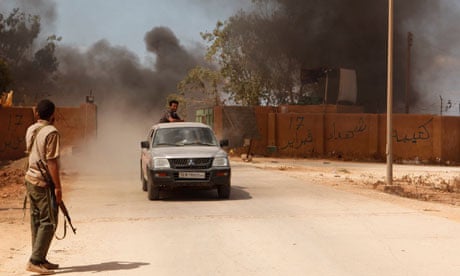The Libyan city of Benghazi was tense after the bodies of six militiamen apparently executed after the storming of a base on the southern outskirts were discovered in a field.
The bodies were found the day after crowds marched on three militia bases, including that of Ansar al-Sharia, blamed by many in the city for the murder of the US ambassador, Chris Stevens, earlier this month. Funerals were held for nine protesters killed when crowds tried to force their way into the Rafallah al-Sahati militia base early on Saturday morning.
The militia was the only one of three to fire back when demonstrators swarmed over their bases, following a rally on Friday in which 30,000 people vowed to retake the streets of the city.
The interior minister, Fawzi Abdul Al, who was criticised for his failure to launch a full investigation of the murder of Stevens and three fellow diplomats, criticised the action of the crowds, saying the militias should have been given more time to incorporate into the official security forces.
The mood in Benghazi is one of both triumph and sorrow at the toll of dead and wounded. Mohammed El Kish, whose cousin was killed by a stray bullet more than a mile from the clashes, said: "He was not even involved in the actions, it is terrible."
City hospitals were braced for more violence after the Rafallah al-Sahati militia reoccupied its looted base. Several hundred unarmed people gathered outside. "This is not good, they should not be here. When the funerals have finished there will be trouble," said Ashraf Saleh.
Police remained in control of the Ansar al-Sharia compound, which is now a looted ruin. A spokesman for Ansar al-Sharia, whose units have dispersed outside the city, insisted they had withdrawn rather than confront protesters "for reasons of security".
The chaos at the heart of Libya's government remains, with some angry that Rafallah was attacked after it had formally been incorporated into the Libyan army. Such designations are lost on many ordinary Libyans, who say many militias from last year's revolution have simply cut deals with ministries, enabling them to form what are in essence private armies.
Washington is likely to draw quiet comfort from the sight of ordinary Libyan civilians confronting jihadists, after a week in which embassies across the Muslim world were firebombed and protests claimed 15 lives in Pakistan. US diplomats in Libya had been at pains not to inflame public opinion, with no criticism of the failure of the Libyan police to launch a full investigation into the killing of Stevens.
Nearly two weeks after his death, an FBI team sent to Tripoli has yet to be given permission to travel to Benghazi. The city's chief prosecutor Saleh Adem Mohammed refused to discuss the case, nor confirm reports of four men arrested on suspicion of the killing. "We are not responsible for what the politicians say."
Rumours are sweeping Benghazi that one of the two US compounds in the city that came under attack housed a small "black ops" unit that had moved to Libya after the rocket attack on the British ambassador in the city in June. The US has yet to explain why some 30 diplomats needed to be evacuated from a consulate that might be expected to have less than half that staff.
But as more eyewitness evidence accumulates, it is clear that the attack on the consulate was unprovoked, and that statements from Washington that it grew out of an anti-American protest appear to be false.
